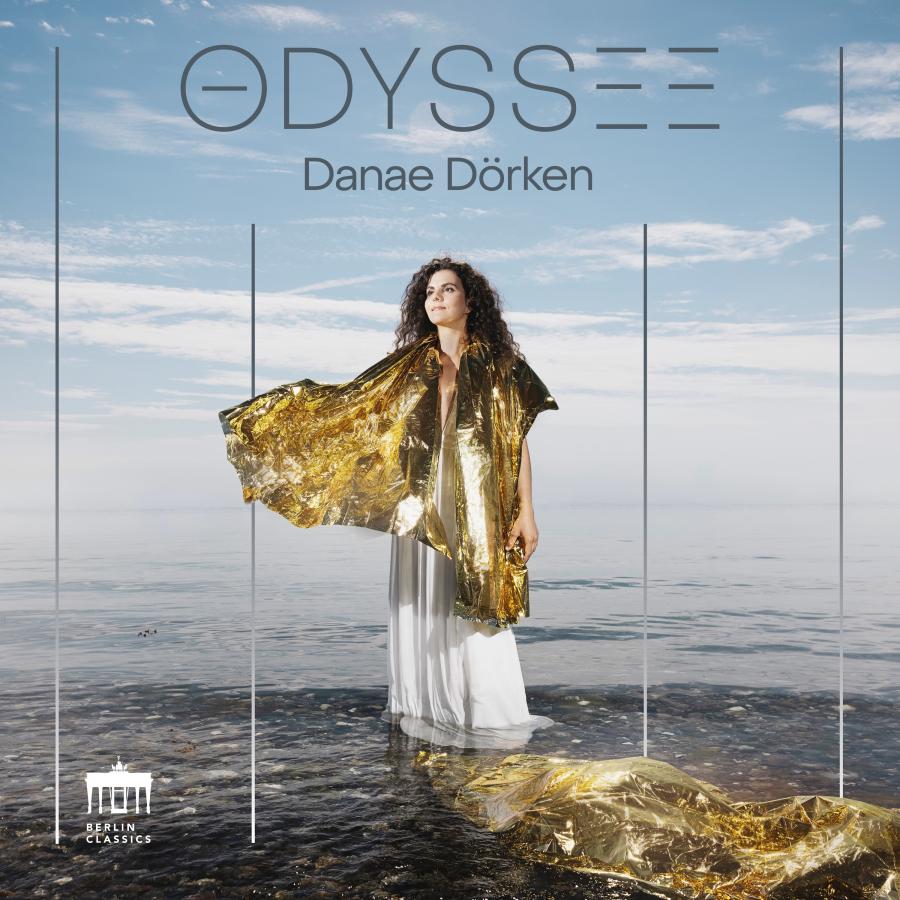The German-Greek pianist Danae Dörken has known the 24 books of Homer’s Odyssey since childhood. “The Odyssey has fascinated me ever since I was small. Even when I was a little girl, my grandparents would read it to me before I went to sleep,” she recalls in her booklet talk with Jesper Klein. The wanderer’s tale from classical antiquity is a story of travelling, making mistakes, going astray, a tale of dreams and landings, and for Danae Dörken it is more contemporary than ever: “I see this as a highly topical story. I believe we are embarked upon a modern Odyssey.” Today’s many challenges, like climate change or worldwide migration as a result of extreme hardship and often violence, keep bringing modern society to unavoidable forks in the road. And the road taken can be very quickly revealed as a dead end, causing a further change of direction. Corona precautions have repeatedly reminded us of that during the past two years.
Rather than losing heart, Danae Dörken finds it “exciting to be living at such a point in time … on such a journey, there are hopeful moments and moments of despair”. And so she has ventured out on her debut album “Odyssee” from Berlin Classics on a quite deliberate musical journey. The album’s release date is April 22, 2022.
This journey begins with Fazıl Say’s piece about loneliness, Black Earth. Then we hear the enchanting voices of the Sirènes from Claude Debussy’s Trois Nocturnes, seductively conveyed by the piano, followed by Charles Gounod’s Souvenance, music of remembrance, which praises life as worth remembering despite all its challenges. Franz Liszt’s Das Wandern focuses on the simple process of moving on. “Felix Mendelssohn’s expansive Fantasie op. 28, rich in lively figuration in the outer movements and the most Classical piece on the album, is actually a piece about travel in the truest sense of the word,” writes Jesper Klein in the booklet. During her research for “Odyssee”, Danae Dörken came across a different kind of piece, Waiting for Friday by Syrian composer Kinan Azmeh – a piece that begins very modestly and casually, only to ascend into immensely dramatic heights and so – says Dörken – to signal that things turn out badly. Not all journeys have a happy ending. In the case of Manos Hatzidakisʼ Waltz of lost dreams, which she heard as a child on a wide variety of instruments, Danae Dörken is reminded at once of Greek dance music: “Greek songs are more often about hard times than good times. It is characteristic of Greek music to celebrate life even when things are difficult,” she reflects. Waltz of lost dreams gives the feel of this Greek mentality. The album’s conclusion comes in the last piece but one, Charles Gounod’s Marche funèbre dʼune marionnette, a funeral march for a puppet, only to release the travelling listener on a reassuring note with Vangelisʼ Moonlight Reflections, dreamily drifting music.
“The proper ending of the journey is the funeral march, as I see it,” maintains Dörken in the booklet. For all her musical engagement, the artist with roots on the Greek island of Lesbos is constantly taking a political stance. With her album “Odyssee”, the pianist also means to draw attention to the never-ending odysseys of fellow human beings driven to flight, many thousands of whom have been forced to stay on the island of Lesbos. “As a Greek woman from Lesbos I am constantly confronted with the refugee crisis, of course. We should like to send the message that humanity is paramount. All the same, it is not enough for the people there to show compassion. It is not a problem that the islanders can solve on their own.” The album “Odyssee” is also an appeal to all of us to understand, to be aware not only of our own journey through life, but to have fellow-feeling for the odyssey of society, of humanity, in our own dealings with others.
The poet Argyris Eftaliotis (1849-1923) is buried on the beach of Eftalou. He translated Homer’s Odyssey into modern Greek. He wrote: “To love the light, you must feel the darkness.”
Odyssee Danae Dörken

Artist

Composer





Further information
Genre
Klassik
Klavier
Publication date
22.04.2022
The German-Greek pianist Danae Dörken has known the 24 books of Homer’s Odyssey since childhood. “The Odyssey has fascinated me ever since I was small. Even when I was a little girl, my grandparents would read it to me before I went to sleep,” she recalls in her booklet talk with Jesper Klein. The wanderer’s tale from classical antiquity is a story of travelling, making mistakes, going astray, a tale of dreams and landings, and for Danae Dörken it is more contemporary than ever: “I see this as a highly topical story. I believe we are embarked upon a modern Odyssey.” Today’s many challenges, like climate change or worldwide migration as a result of extreme hardship and often violence, keep bringing modern society to unavoidable forks in the road. And the road taken can be very quickly revealed as a dead end, causing a further change of direction. Corona precautions have repeatedly reminded us of that during the past two years.
Rather than losing heart, Danae Dörken finds it “exciting to be living at such a point in time … on such a journey, there are hopeful moments and moments of despair”. And so she has ventured out on her debut album “Odyssee” from Berlin Classics on a quite deliberate musical journey. The album’s release date is April 22, 2022.
This journey begins with Fazıl Say’s piece about loneliness, Black Earth. Then we hear the enchanting voices of the Sirènes from Claude Debussy’s Trois Nocturnes, seductively conveyed by the piano, followed by Charles Gounod’s Souvenance, music of remembrance, which praises life as worth remembering despite all its challenges. Franz Liszt’s Das Wandern focuses on the simple process of moving on. “Felix Mendelssohn’s expansive Fantasie op. 28, rich in lively figuration in the outer movements and the most Classical piece on the album, is actually a piece about travel in the truest sense of the word,” writes Jesper Klein in the booklet. During her research for “Odyssee”, Danae Dörken came across a different kind of piece, Waiting for Friday by Syrian composer Kinan Azmeh – a piece that begins very modestly and casually, only to ascend into immensely dramatic heights and so – says Dörken – to signal that things turn out badly. Not all journeys have a happy ending. In the case of Manos Hatzidakisʼ Waltz of lost dreams, which she heard as a child on a wide variety of instruments, Danae Dörken is reminded at once of Greek dance music: “Greek songs are more often about hard times than good times. It is characteristic of Greek music to celebrate life even when things are difficult,” she reflects. Waltz of lost dreams gives the feel of this Greek mentality. The album’s conclusion comes in the last piece but one, Charles Gounod’s Marche funèbre dʼune marionnette, a funeral march for a puppet, only to release the travelling listener on a reassuring note with Vangelisʼ Moonlight Reflections, dreamily drifting music.
“The proper ending of the journey is the funeral march, as I see it,” maintains Dörken in the booklet. For all her musical engagement, the artist with roots on the Greek island of Lesbos is constantly taking a political stance. With her album “Odyssee”, the pianist also means to draw attention to the never-ending odysseys of fellow human beings driven to flight, many thousands of whom have been forced to stay on the island of Lesbos. “As a Greek woman from Lesbos I am constantly confronted with the refugee crisis, of course. We should like to send the message that humanity is paramount. All the same, it is not enough for the people there to show compassion. It is not a problem that the islanders can solve on their own.” The album “Odyssee” is also an appeal to all of us to understand, to be aware not only of our own journey through life, but to have fellow-feeling for the odyssey of society, of humanity, in our own dealings with others.
The poet Argyris Eftaliotis (1849-1923) is buried on the beach of Eftalou. He translated Homer’s Odyssey into modern Greek. He wrote: “To love the light, you must feel the darkness.”
Tracklist - These are the tracks you will hear on the album
Odyssee
Danae Dörken
1
Black Earth
2
Sirènes
3
Souvenance
4
Das Wandern, S. 565 No. 1
5
Fantasie in F-Sharp Minor, Op. 28
6
Prélude à l'après-midi d'un faune, L. 86
7
Waiting For Friday
8
2. Au lac de Wallenstadt
9
Waltz of lost Dreams
10
Marche funèbre d'une marionnette, CG 583
11
Moonlight Reflections



















